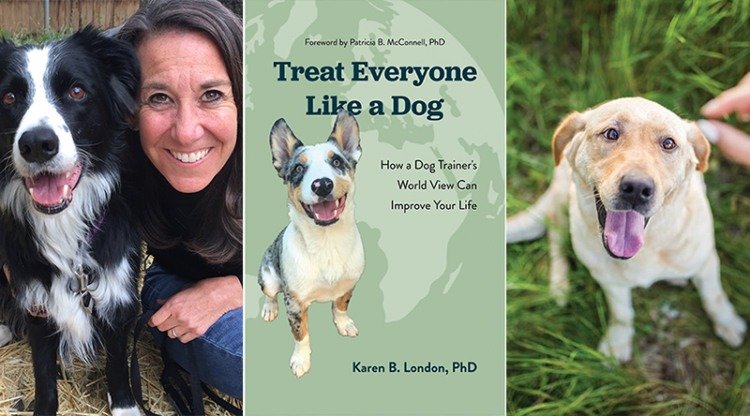Finally! A how-to for those of us who would like to both reduce conflict in our lives and have things go our way a little more often. The second part of that statement (which is mostly tongue-in-cheek) references one of positive reinforcement’s (R+) proven benefits: Rewarding behavior you like tends to get you more of that behavior, while ignoring what you don’t like gets you less. Whether we’re looking for a little cooperation from our dogs, our children, our spouse, our in-laws or our friends, this book provides a roadmap, a way to accomplish that sans drama (and sans yelling).
Karen London is one of The Bark’s long-time, go-to dog training and behavior experts, and her advice is thoroughly grounded in more than two decades of experience using R+ methods to help dogs learn better ways of interacting with others and living in our human world. As she points out in her introduction, dog trainers know how to influence behavior. “The real magic of dog training, which is not supernatural at all, is the thoughtful and careful application of established techniques for influencing behavior.”
So, when she says “Treat everyone like a dog,” she means that literally: Treat everyone the way highly qualified, professional R+ dog trainers treat their subjects: with respect, with patience and with regard for what they need in order to learn new ways of doing things.
In this book, subtitled How a Dog Trainer’s World View Can Improve Your Life, London distills her years of experience and study into several carefully focused chapters. From “Positivity” to “Further Principles and Ideas from Dog Training,” they cover a lot of ground. It’s a plus that she does it in an accessible way; rather than blinding us with science (although science clearly underlies the points she’s making), she presents us with theories, practices and outcomes in a conversational style that makes them easy to take in.
London has packed her book with many examples from both the canine- and the human-centric worlds, intermixing them in a way that gives the reader a real appreciation for how much alike the two are. A dog being yelled at for not responding to a cue he doesn’t know and a child being demeaned for not understanding a math problem: similar dynamics, identical outcomes (instead of learning, becoming immobilized by the fear of making a mistake).
Though she provides examples and makes her points in a good-natured and often humorous way, they can land with particular resonance. Those of us who have vivid memories of times we reacted badly and let down our dogs, our children and others will recognize ourselves in many of them. (She doesn’t exclude herself from this group, by the way—one of the things that makes the book so relatable.)
As L.P. Hartley wrote in his novel, The Go-Between, “The past is a foreign country, they do things differently there.” But in the present, it’s never too late to improve our scorecard … and to make our lives, and the lives of those whose lives we touch, less fraught and more collaborative. To do things differently, with better outcomes.
In her foreword, Patricia McConnell, PhD (London’s mentor and co-author on several earlier books) observes that “influencing behavior successfully is not rocket science, but most of us didn’t grow up knowing how to do it.” Thankfully, reading Treat Everyone Like a Dog goes a long way toward filling that gap.
via Whisker Therapy
